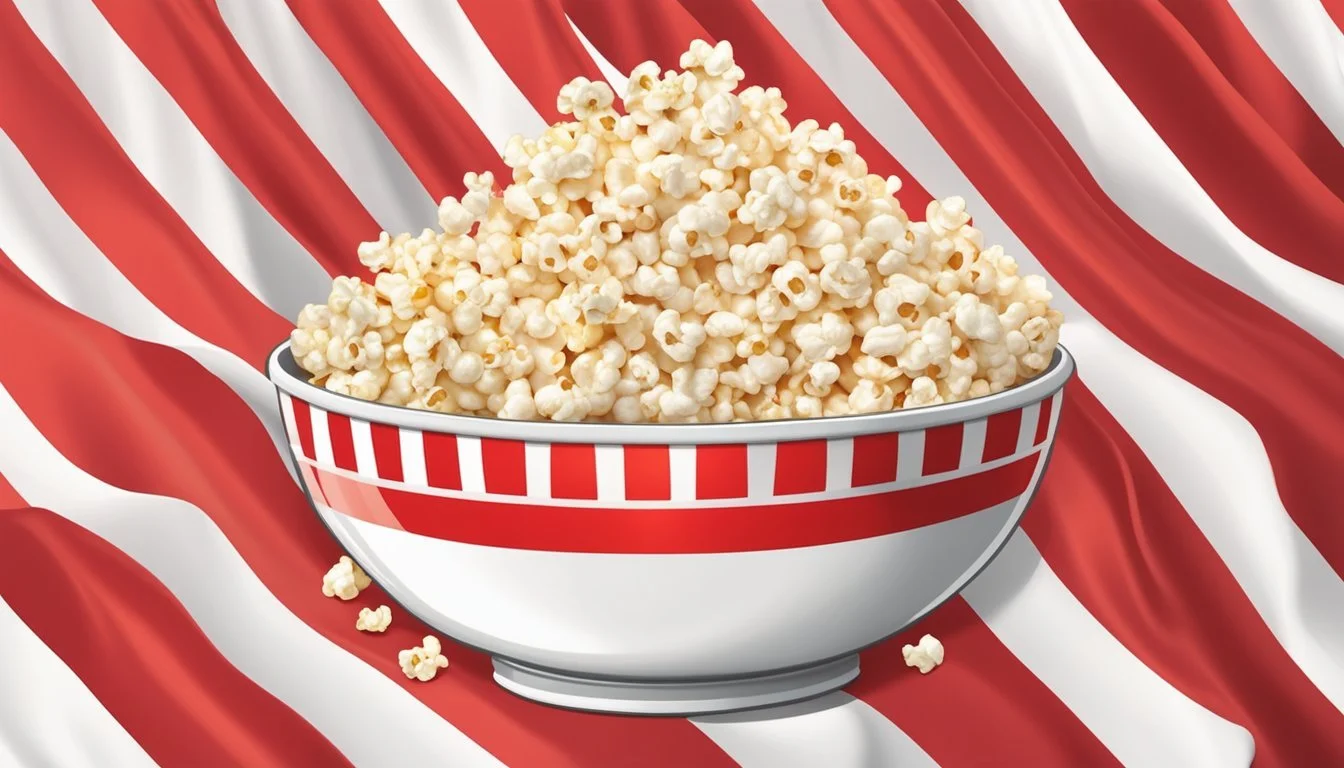Popcorn on Carnivore Diet
Can You Include It in Your Meal Plan?
The carnivore diet is an exclusionary diet that focuses solely on the consumption of animal products and excludes all plant-based foods. It's grounded in the belief that human beings are primarily meat-eaters and that many of the health issues faced today are due to a departure from this ancestral way of eating. Proponents argue that reducing carbohydrate intake by eliminating plants can improve health, reduce inflammation, and lead to weight loss.
Popcorn, a snack cherished by many for its simplicity and versatility, finds itself at odds with the carnivore diet's strict guidelines. Made from the kernels of a plant, corn, popcorn is naturally excluded from a diet that only permits the consumption of animal-derived foods. In addition to being plant-based, popcorn also contains carbohydrates, which the carnivore diet minimizes or eliminates.
Individuals considering popcorn while following a carnivore diet must recognize that it does not align with the fundamental principles of the regimen. While some may look for loopholes or adaptations to include low-carb plant foods like popcorn, strict adherence to the diet would require abstaining from popcorn altogether. This approach underscores the importance of understanding dietary restrictions and the rationale behind them when choosing to adopt a specific eating plan.
Overview of the Carnivore Diet
In the realm of dietary plans, the carnivore diet emphasizes exclusive consumption of animal products and excludes all plant-based foods, focusing on meat as the staple source of nutrition.
Defining the Carnivore Diet
The Carnivore Diet is an all-meat diet that consists solely of animal products. Characterized by its exclusion of fruits, vegetables, grains, nuts, and seeds, it is a zero-carb regimen that purports health benefits through a natural, evolutionarily consistent diet. Proponents argue that it provides all necessary nutrients, while opponents raise concerns about potential nutrient deficiencies and long-term health effects.
Historical Background
This diet's roots can be traced to the evolutionary diets of early humans who predominantly consumed animal-based foods. In recent years, individuals like Shawn Baker have reignited interest in the Carnivore Diet, claiming improved health and well-being from adopting this way of eating. Historical precedents are often cited as justification for its potential benefits and natural alignment with human biology.
Popularity and Public Perception
The Carnivore Diet has surged in popularity, especially within certain low-carb and ketogenic diet communities. Public perception varies, with some people swearing by its effectiveness for weight loss and mental clarity, while others criticize its restrictive nature and possible health risks. Its growth is partly attributable to anecdotal evidence and the promotion by high-profile individuals within the low-carb community.
Nutritional Components of the Carnivore Diet
The carnivore diet is characterized by its exclusive consumption of animal products, focusing on high protein and fat intake while excluding plant-based foods. This section explores the primary foods, their macro and micronutrient profiles, and potential nutrient deficiencies within the carnivore diet.
Primary Foods Consumed
The carnivore diet consists solely of animal-based foods. These include:
Meats: Beef, lamb, pork, chicken, and turkey.
Fish: Salmon, mackerel, sardines, and trout.
Eggs: Chicken, duck, and other types of eggs.
Dairy Products: Cheese, butter, and cream (though some individuals opt for a dairy-free approach).
Organ Meats: Liver, heart, kidney, and brain, which are rich in various essential nutrients.
Role of Macronutrients and Micronutrients
Proteins: They are the building blocks of the body, vital for muscle repair and growth. Animal proteins provide all essential amino acids.
Fats: Animal fats are a primary energy source on the carnivore diet and include saturated, monounsaturated, and polyunsaturated fats with essential fatty acids.
Vitamins and Minerals: Organ meats are especially high in vitamins A, B complex, D, E, and minerals such as iron, selenium, and zinc. Certain fish are rich in vitamin D and omega-3 fatty acids.
Potential Nutrient Deficiencies
While the diet can provide key nutrients from animal products, individuals might be at risk of certain nutrient deficiencies:
Vitamin C: Normally found in fruits and vegetables, its absence can be mitigated by consuming fresh meat and organ meats.
Fiber: Generally sourced from plants, fiber's absence could affect digestion, although some proponents report no issue.
Micronutrients: Lacking in variety, some micronutrients commonly found in plants might be missing, such as magnesium and potassium, which can necessitate targeted supplementation.
I highly recommend purchasing vitamin C, fiber supplement, magnesium, and potassium online for a convenient shopping experience!
Foods Excluded from the Carnivore Diet
The Carnivore Diet strictly limits consumption to animal products, thereby excluding a significant range of food groups, particularly those originating from plants, as well as certain dairy products that contain sugars and carbohydrates.
Plant-Based Foods Omission
Vegetables: None are permitted on the Carnivore Diet, as they are considered plant-based foods.
Fruits: Also excluded due to their plant origin and inherent sugar content.
Grains: Not allowed, encompassing all types, such as wheat, rice, oats, and corn (including popcorn).
Legumes: Beans, lentils, peas, and other legumes are off-limits.
Nuts and Seeds: As plant-based sources of fat, they are to be avoided.
This section of foods encompasses anything that grows from the ground or on a plant, inherently categorizing them as incompatible with the Carnivore Diet.
The Elimination of Carbohydrates and Fiber
Fiber: Found in plant-based foods, fiber is not consumed on the Carnivore Diet.
Sugars: Natural or added sugars present in fruits, certain dairy products, and other plant-based foods are excluded.
Carbohydrates: All forms, including simple and complex carbs from plant sources, are eliminated.
Those adhering to the diet eradicate the intake of these macronutrients due to their association with plant foods, which is contrary to the Carnivore Diet's principles. This results in a focus solely on animal-based products.
Health Implications
When considering the inclusion of popcorn in a carnivore diet, its health implications are multifaceted, affecting weight, body composition, and chronic diseases, while also posing certain digestive considerations.
Effects on Weight and Body Composition
Popcorn, although a plant-based food, is lower in carbohydrates than many other grains. This can be beneficial for individuals seeking to manage their weight, as consuming fewer carbohydrates may lead to reduced calorie intake and consequently weight loss. In a carnivore diet, maintaining a state where the body utilizes fat for energy—a process known as ketosis—can be central to changing body composition. However, as popcorn is not an animal product, its inclusion would typically be inconsistent with a strict carnivore approach.
Popcorn and Weight Management:
Low in carbohydrates relative to volume
Can prompt a sense of fullness with minimum calorie intake
Impact on Chronic Diseases
Dietary practices can significantly impact chronic diseases, including blood sugar management, high blood pressure, and inflammation related conditions such as arthritis and mental health issues like depression. The carnivore diet eliminates plant-based foods, which can substantially reduce sugar and carbohydrate intake and might be beneficial for blood sugar stabilization. However, the complete absence of plant-based foods could also mean missing out on certain nutrients known to assist in the management of blood pressure and inflammation. Popcorn, as a plant-based food, provides dietary fiber, which might benefit those looking for an option to aid digestion, but its place in the carnivore diet remains contentious due to its non-animal origin.
Chronic Disease Considerations:
Reduced carbohydrate intake: Potentially beneficial for blood sugar control.
Higher saturated fat intake: May raise concerns about heart health.
Digestive Health Considerations
The carnivore diet is inherently low in fiber since it typically excludes plant-based foods. Fiber is essential for a healthy digestive system, playing a crucial role in gut health and the prevention of constipation. Introducing popcorn could offer fiber, potentially aiding in digestive health. It's important, however, to note the balance, as a sudden increase in fiber for individuals not accustomed to it could cause digestive distress. Popcorn's inclusion might also alter the gut microbiome, which in the context of the carnivore diet, is tailored to a high-fat, high-protein, low-fiber environment.
Digestive System and Fiber Intake:
Popcorn provides fiber: May improve digestive health.
Shift in diet: Sudden changes can affect digestion and gut microbiome.
Popcorn's Place in the Carnivore Diet
Popcorn, commonly known from corn kernels, often poses questions about its compatibility with the carnivore diet. The carnivore diet focuses on animal products and excludes plant-based foods.
Assessing Legitimacy of Incorporating Popcorn
Individuals on the carnivore diet strictly avoid plant-based foods. Popcorn is derived from corn, which is a grain, and therefore does not have a legitimate place within the diet's guidelines. This diet's foundation lies in consuming only animal-based products, emphasizing protein and fat while eliminating carbohydrates from plant sources. Given that popcorn is a grain, it inherently contradicts the fundamental principles of a carnivore diet.
Potential Impact of Popcorn on Ketosis and Digestion
Ketosis is a metabolic state often associated with the carnivore diet, where the body burns fat for fuel instead of carbohydrates. Since popcorn is a source of carbohydrates with a notable amount of fiber, it could disrupt the state of ketosis:
Carbs: Introducing popcorn into the diet could potentially take the body out of ketosis due to its carbohydrate content.
Digestion: The digestive system may adapt to a predominantly meat-based diet, and reintroducing fibrous foods like popcorn could cause digestive discomfort.
In summary, popcorn does not align with the carnivore diet's objectives, which revolve around maintaining ketosis and simplifying digestion by focusing exclusively on animal-derived foods.
Lifestyle Implications and Modifications
Adhering to a carnivore diet requires significant lifestyle changes, especially in terms of meal planning, social dining, and beverage choices. It's crucial for individuals to understand what modifications are necessary to maintain this diet effectively.
Meal Planning and Recipes
Successful adherence to a carnivore diet hinges on meticulous meal planning. It is important for individuals to tailor their meals around animal products only. A typical meal plan could include:
Breakfast: Scrambled eggs with cheddar cheese.
Lunch: Grilled chicken breasts with a side of beef jerky.
Dinner: Pork chops cooked in butter with a side of organ meats.
For those with a penchant for snacks, pork rinds can replace popcorn as a zero-carb option. Egg yolks and bone marrow might also be incorporated into recipes for added nutrition.
Eating Out and Social Situations
Dining out or partaking in social events can be challenging for those on a carnivore diet. They must carefully select establishments that offer options such as:
Steak houses: Where they can order cuts like ribeye or sirloin.
Barbecue spots: Offering meats like brisket or ribs without sugary sauces.
Seafood restaurants: To enjoy fish and shellfish.
It is also advisable to politely inform hosts of dietary restrictions ahead of any social gatherings to ensure suitable food options are available.
Alcohol and Beverages
When it comes to beverages, options are limited. Water, black coffee, and tea are typically acceptable. Milk, while an animal product, often contains sugars and may be best avoided. The consumption of alcohol is usually discouraged due to its non-animal origin and potential to disrupt diet adherence. However, if one chooses to drink, spirits with zero carbs like vodka or whiskey may be preferred, consumed in moderate amounts and without sugary mixers.
Common Meats and Alternatives
This section provides an overview of the diverse meat sources available on the carnivore diet, detailing their nutritional benefits and the role of seafood and poultry as essential components of the diet.
Various Meat Sources and Their Benefits
The carnivore diet primarily consists of animal-based food items. Here's a breakdown of common meat sources and their advantages:
Beef: A rich source of protein and B vitamins, particularly B12, beef also provides vital minerals such as zinc and iron.
Pork: Contains thiamine, which is crucial for proper brain function, and is another excellent source of high-quality protein.
Lamb: Offers high levels of omega-3 fatty acids, which are beneficial for cardiovascular health.
Bison: Leaner than beef, bison is dense in nutrients and lower in calories, while still being a great provider of iron and protein.
Each type of meat brings its own unique set of nutrients, which can support muscle growth, immune function, and overall health.
Inclusion of Seafood and Poultry
Incorporating seafood and poultry can enhance a carnivore diet's nutritional profile:
Seafood: Options like salmon, mackerel, and oysters are high in omega-3 fatty acids and are important for brain health and reducing inflammation.
Salmon: High in protein and omega-3s, known for its role in heart health.
Mackerel: Another fish that's high in omega-3s and vitamin D.
Oysters: Low in calories yet high in minerals like zinc.
Poultry: Including chicken and duck offers diversity and provides essential nutrients.
Chicken: A lean protein source, beneficial for weight management and muscle maintenance.
Duck: Richer in fat, offering more calories and a different flavor profile.
Both seafood and poultry serve as alternative protein sources to red meat, providing variety and balancing the diet with wide-ranging essential nutrients.
Supplementation and Health Monitoring
When adopting a carnivore diet, individuals must consider the adequacy of nutrient intake and the importance of monitoring health parameters. Specific supplementation strategies may become necessary, and consulting healthcare providers for personalized guidance ensures that nutritional needs are met without compromising health.
Supplementation Strategies
On a carnivore diet, which excludes plant-based foods, vitamin C and certain minerals can become points of concern. Vitamin C is present in animal tissues, but in smaller amounts compared to fruits and vegetables. Some argue that the reduced need for antioxidants on a low-carb diet compensates for the lower vitamin C intake. However, they should evaluate their diet for signs of deficiency and consider supplementation if necessary. Here is an essential breakdown of nutrients often discussed in the context of a carnivore diet:
Vitamin C: Found in fresh meats, particularly organ meats like liver
Minerals: Abundant in meats, especially magnesium and zinc
Individuals should monitor their intake and address any potential nutrient gaps through tailored supplementation, if needed.
Consulting Healthcare Providers
Regular consultations with a healthcare provider are crucial for those on a carnivore diet. Providers can offer detailed insights into individual nutrient requirements and track health changes. They perform assessments relevant to the person's diet, such as:
Measuring levels of nutrients in the blood
Recommending supplements based on dietary limitations
Patients should ensure that their healthcare provider is informed about their diet, as this knowledge can help in making accurate evaluations and providing precise advice on the need for supplementation.
Pros and Cons of the Carnivore Diet
Exploring the carnivore diet reveals both potential benefits and associated risks. Individuals considering this diet should weigh these factors carefully.
Potential Benefits of the Diet
The carnivore diet, which promotes the exclusive consumption of animal products, may lead to rapid weight loss due to its very low carbohydrate profile. Weight loss can be significant, primarily due to a reduction in calorie intake and the body's shift to burning fat for fuel. The diet's simplicity makes it easy to follow, potentially leading to improved adherence and progress. Some adherents report increased satiety and decreased inflammation.
Benefits:
Rapid weight loss
Simplicity in meal planning
Improved satiety
Decreased inflammation in some individuals
Addressing the Risks and Criticisms
The diet does not come without risks. Critics argue that the absence of plant-based foods could lead to nutrient deficiencies and long-term health issues. Concern over high intake of saturated fat and potential links to heart disease is frequently mentioned. There is also the possibility of an increased risk of constipation due to the lack of dietary fiber.
Risks:
Nutrient deficiencies due to the lack of plant-based foods
Potential increase in heart disease risk due to high saturated fat intake
Constipation from insufficient dietary fiber
Moreover, completely eliminating carbohydrates and plant-based additives can impact gut health and long-term wellbeing. The carnivore diet's restrictive nature could also lead to social isolation or disordered eating patterns. It's clear that while some individuals may experience benefits, one should consider the potential risks and criticisms when evaluating the carnivore diet.
Comparative Analysis with Other Diets
This section explores how the carnivore diet contrasts with other dietary frameworks, specifically the ketogenic diet and various plant-based diets, with a focus on the inclusion or exclusion of specific food types.
Ketogenic Diet Versus Carnivore Diet
The ketogenic diet and carnivore diet are both low-carb approaches, but they differ significantly in their food list and macronutrient distribution.
Allowed Foods:
Ketogenic Diet: Includes animal foods, dairy, low-carb vegetables, nuts, and seeds.
Carnivore Diet: Exclusively animal foods; plant foods are excluded entirely.
Macronutrient Composition:
Ketogenic Diet: High in fats, moderate in protein, very low carbohydrates.
Carnivore Diet: High in protein and fats, virtually zero-carb.
In the ketogenic diet, one must balance the intake of fats, proteins, and a restricted amount of carbohydrates to achieve a state of ketosis, while the carnivore diet promotes an even more stringent approach, eliminating all plant-derived foods—including those low in carbohydrates like avocados and nuts—thus making it effectively a zero-carb diet as per the food list. Dairy is sometimes permissible in the carnivore diet, depending on individual tolerance.
Plant-Based Diets Comparison
When comparing the carnivore diet to plant-based diets, the stark difference lies in the primary source of nutrition: the former relies solely on animal-derived foods, while the latter emphasizes plants as the main food source.
Fiber Intake:
Plant-Based Diets: Typically high due to the consumption of fruits, vegetables, legumes, and grains.
Carnivore Diet: None, as it excludes all plant-based foods.
Plant-based diets offer a wide variety of carbohydrates that contain fiber, which aids in digestive health. In contrast, the carnivore diet contains no fiber since it restricts plant-based foods entirely. Proponents of the carnivore diet argue that fiber is not necessary for digestive health, which is a point of contention among nutrition experts.
By focusing on these dietary frameworks, readers can discern the major differences in dietary philosophy, particularly concerning macronutrient profiles and fiber consumption.
Transitioning and Adherence to the Carnivore Diet
Adopting the carnivore diet involves a definitive shift in one's eating habits, focusing primarily on meats and animal products, while completely eliminating plant-based foods. It's essential to understand the initial steps to get started and the strategies for maintaining a long-term commitment.
Getting Started with the Carnivore Diet
When someone begins the carnivore diet, they primarily consume meats such as beef, chicken, and pork, along with other animal products. A key component for beginners is to ensure a variety of meat sources to maintain nutritional balance. Liver is an especially nutrient-dense option that provides a broad spectrum of vitamins and minerals. One might start with ground beef, a versatile meat that can be prepared in many ways, making the transition easier. It's common to use tallow, rendered beef fat, for cooking to add calories and fat content for satiety and energy.
Sample Initial Meal Plan:
Breakfast: Scrambled eggs with diced beef liver.
Lunch: Pan-fried ground beef patties cooked in tallow.
Dinner: Grilled steak with a side of sautéed chicken liver.
Since the carnivore diet excludes plant-based foods, individuals will not consume dietary fiber. Thus, it's important they are prepared for changes in digestive processes, which may include temporary periods of constipation or diarrhea as the body adapts.
Maintaining Long-Term Commitment
Ensuring a long-term commitment to the carnivore diet requires persistence and a willingness to adapt to a lifestyle centered around animal products. Consuming a variety of meats, such as beef steaks, organ meats like beef liver, and fatty cuts can help prevent nutrient deficiencies and maintain enthusiasm for the diet.
Incorporating routine and diversity in meal preparation can assist in preventing boredom with the dietary choices. It's beneficial for individuals to experiment with different cooking methods, such as braising, roasting, or grilling, to keep their meals appealing. Regular consumption of high-quality animal fats and proteins is essential to fuel the body adequately and sustain adherence to the diet.
Strategies for Longevity:
Regular inclusion of a diverse range of animal products.
Experimentation with cooking methods.
Prioritization of high-quality, nutrient-dense animal sources.
Maintenance of the carnivore diet also entails a firm understanding of the reasons for following this dietary pattern, including personal health objectives and preferences. People following this diet may seek a sense of community or support groups, as sharing experiences can provide encouragement and sustain motivation.
Conclusion
The carnivore diet strictly comprises animal products, categorically excluding plant-based foods. Popcorn, deriving from corn kernels, is incompatible with the carnivore diet's principles. It not only originates from a plant but is also considered a grain, a type of food entirely omitted on this regimen.
Popcorn's nutritional profile, while low in carbohydrates relative to other grains, does not align with the zero-carb philosophy central to the carnivore diet. Proponents of the diet avoid all forms of carbohydrates, focusing on meat, fish, eggs, and some dairy products. Popcorn does not find its place within this structure. Moreover, they commonly exclude additives, which often accompany popcorn, especially when commercially flavored or prepared.
For individuals not on a carnivore diet, popcorn can be a healthy snack option when air-popped and minimally seasoned. However, it's essential to prepare it without excessive fats or added sugars to retain its healthful qualities.
In terms of health implications, while the carnivore diet's efficacy and safety are under debate, it eliminates the nutritional benefits plants offer, such as fiber, vitamins, minerals, and phytochemicals. Regardless of dietary choice, understanding the nutrient composition of each food item, including popcorn, and its place—or lack thereof—in one's diet is crucial for informed eating habits.

















